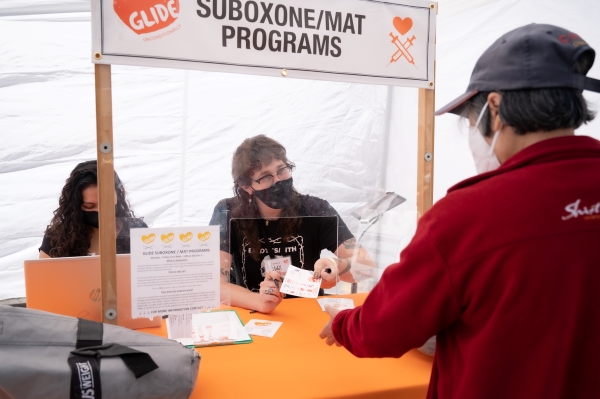
Advancing the Cause of Mental Health at GLIDE
May is Mental Health Awareness month and as an organization that is radically inclusive and seeks to alleviate suffering, we know that much more needs to be done to treat mental illness; a condition that affects close to 60 million Americans.
Tackling a complicated problem like mental illness requires patience and empathy. We know that a decline in mental facilities can contribute to issues such as drug overdose and contribute to poorer health outcomes. Studies done by the National Institutes of Health have found that people with mental disorders such as anxiety, or post-traumatic stress disorder may use drugs or alcohol as a form of self-medication.
Recognizing the inherent value that each human being holds means overcoming the stigma attached to mental illness and providing the care needed to improve overall health.
GLIDE’s implementation of harm reduction strategies puts it at the forefront of evidence-based actions that help reduce harm and improve results associated with drug use and drug overdose mortality.
“We train our harm reduction staff to be clinically minded,” says GLIDE’s new Director of Health Access, Michael Discepola. “This means we’re training them to understand ways to de-escalate, understand and respond effectively to trauma, and know how to respond to someone in distress, to someone who may be hearing voices or might be actively psychotic.”
The past few years have seen drug overdose deaths skyrocket in California while overdose deaths in San Francisco climbed year over year, according to the San Francisco Medical Examiner. Overdose deaths among Latino and Black people have also seen a particularly significant increase in 2023.
Drug overdoses in San Francisco killed 34 Latino people in 2023, a 62% increase from the 21 deaths last year, while deaths of Black people rose by 61%, from 41 to 66. Total accidental overdose deaths for this year in San Francisco are up to 268 (up from 142 in 2022) with a vast majority of deaths involving fentanyl.
We know from evidence that Black San Franciscans are far more likely to die of an overdose than people of other racial groups relative to their population, according to medical examiner data.
These distressing facts are not lost upon Michael, who oversees GLIDE’s harm reduction team as they engage individuals on the streets who are suffering from psychiatric disabilities. GLIDE’s resource navigators use a low threshold to provide help to those seeking to overcome their difficult circumstances.
“A one size for care does not fit all. We need many approaches – we need to fund and value all methods that are effective and not judge or stigmatize,” says Michael. “We must recognize that people are struggling and using substances to cope with their trauma. People on the street will use stimulants to protect themselves and they will use more stimulants to stay up at night, so they do not lose their belongings, or get attacked.”
We know supervized overdose prevention centers work. GLIDE’s Center for Social Justice alongside community partners worked to get legislation passed in Sacramento last year that would have created a pilot study to evaluate the effectiveness of creating three supervised consumption sites in San Francisco, Oakland, and Los Angeles. Governor Gavin Newsom vetoed the legislation.
Shapreece Martinez, GLIDE’s Walk-In-Center (WIC) Shift Lead says many of GLIDE’s day to day homeless clients have mental health and/or substance abuse disorder. WIC tries hard to give proper referrals depending on what their needs are.
But chronic homelessness can lead to depression, according to Shapreece.
“Our clients are low-income, poor, on public assistance, and cannot afford the proper care and treatment they require. Many times, we offer a shoulder to cry on in times they need to release,” says Shapreece. “We offer an ear in time of grief and a hand when they need help with guidance,” she added.
Michael is no stranger to driving the tenants of harm reduction having formerly worked as Vice President of Behavioral & Substance Use Health for the San Francisco AIDS Foundation and previously at UCSF (University of California, San Francisco) as Associate Director for the Stonewall Project.
“We know that there has never been an overdose in any one of these overdose prevention centers. And if we want to approach this from a public health perspective, then it is our responsibility to intervene and do the work to assist those people on the streets. We do not have enough providers willing to do this kind of work. And this is where GLIDE steps in.”
